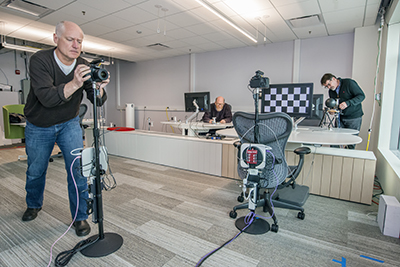Genentech

The Challenge: Maximum Savings
The biotech company Genentech had ambitious energy-efficiency and employee-comfort goals for its new 255,000-square-foot building in South San Francisco. But how could the company make sure the building would perform as intended?
The Solution: FLEXLAB®
The newly operational U.S. Department of Energy's FLEXLAB® facility at Lawrence Berkeley National Laboratory (Berkeley Lab) provided a world-class facility for testing and optimizing integrated building systems under real-world conditions and maintaining the high performance of the building once it is occupied. FLEXLAB takes the guesswork out of creating a comfortable work environment in an energy-efficient building and provides other benefits, as well.

The Bottom Line: State-of-the-Art Building Sets a New Bar for Energy Efficiency and Control
- Genentech estimates that this new building will be approximately 30 percent more efficient, based in part on the data collected with the FLEXLAB experiment.
- The FLEXLAB experiment showed Genentech how to reduce energy use for lighting by 60 percent in open-plan office areas.
- That’s energy savings of 60 percent on a baseline that already included daylight dimming.
- These additional savings were achieved by aggressively tuning the lighting controls beyond the default daylight-dimming baseline commissioned by the lighting-control vendor.
- The energy saved – documented in April/May as an absolute savings of 106 kWh per day – extrapolates to a savings of roughly $4,145 per year from this one lighting-control measure alone (assuming 15¢ per kWh).
- With an estimated payback time frame of three to five years, and continued energy savings after that, FLEXLAB testing made good business sense for Genentech.
- Genentech knows a comfortable workspace enables its employees to do their best work.
Download the full case study here: Genentech
"FLEXLAB represents a handshake between science and architecture."
—Andrew Keller, Genentech Senior Principal Site Planner
